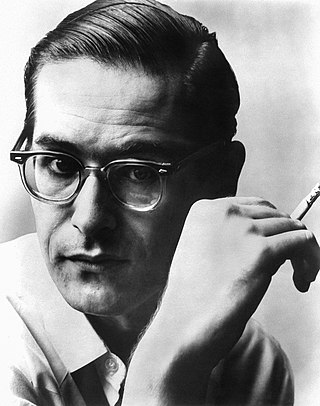
William John Evans was an American jazz pianist and composer who worked primarily as the leader of his trio. His use of impressionist harmony, block chords, innovative chord voicings, and trademark rhythmically independent, "singing" melodic lines continue to influence jazz pianists today.

Edgar Gómez is a Puerto Rican jazz double bassist, known for his work with the Bill Evans Trio from 1966 to 1977.

Thomas William Ellis Smith is a Scottish jazz saxophonist, composer, and educator.

Claus Ogerman was a German arranger, conductor, and composer best known for his work with Billie Holiday, Antonio Carlos Jobim, Frank Sinatra, Bill Evans, Michael Brecker, and Diana Krall.

Everybody Digs Bill Evans is a trio and solo album by jazz pianist Bill Evans. It was released in early 1959 on the Riverside Records label.
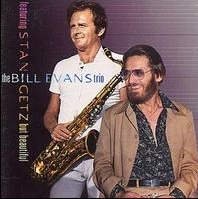
But Beautiful is a jazz album by the Bill Evans Trio with Stan Getz, recorded live in Europe in 1974 and released in 1996.

You Must Believe in Spring is an album by American jazz pianist Bill Evans, recorded by him with bassist Eddie Gómez and drummer Eliot Zigmund in August 1977 and released in February 1981, shortly after Evans's death in September 1980.
Marty Morell is a jazz drummer who was a member of the Bill Evans Trio for seven years—longer than any other drummer. Before joining Evans, he worked with the Al Cohn-Zoot Sims Quintet, Red Allen, Gary McFarland, Steve Kuhn, and Gábor Szabó.

Alone is a solo piano album by jazz musician Bill Evans, recorded in the fall of 1968 for Verve Records, featuring a particularly notable 14+-minute performance of the jazz standard "Never Let Me Go." Evans contributed notes to the album, including the following statement:
Perhaps the hours of greatest pleasure in my life have come about as a result of the capacity of the piano to be in itself a complete expressive musical medium. In retrospect, I think that these countless hours of aloneness with music unified the directive energy of my life. At those times when I have achieved this sense of oneness while playing alone, the many technical or analytic aspects of the music happened of themselves with positive rightness which always served to remind me that to understand music most profoundly one only has to be listening well. Perhaps it is a peculiarity of mine that despite the fact that I am a professional performer, it is true that I have always preferred playing without an audience. This has nothing to do with my desire to communicate or not, but rather I think just a problem of personal self-consciousness which had to be conquered through discipline and concentration. Yet, to know one is truly alone with one’s instrument and music has always been an attractive and conducive situation for me to find my best playing level. Therefore, what I desired to present in a solo piano recording was especially this unique feeling.

I Will Say Goodbye is an album by American jazz pianist Bill Evans, recorded in 1977 but not released until January 1980. It was his final album for Fantasy Records, making the title quite appropriate.

Bill Evans Trio with Symphony Orchestra is an album by American jazz pianist Bill Evans and his trio, released in 1966, featuring jazz arrangements of works by classical composers Granados, J.S. Bach, Scriabin, Fauré, and Chopin. The group is accompanied by an orchestra arranged and conducted by Claus Ogerman. Originals by both Evans and Ogerman are also included.

Quintessence is an album by American jazz pianist Bill Evans. It was recorded in 1976 for Fantasy Records and released the following year. At this time usually playing solo or with his trio, for these sessions Evans was the leader of an all-star quintet featuring Harold Land on tenor saxophone, guitarist Kenny Burrell, Ray Brown on bass, and Philly Joe Jones on drums.

The Gary McFarland Orchestra is an album by Gary McFarland's Orchestra with guest soloist jazz pianist Bill Evans recorded in 1963 for the Verve label.
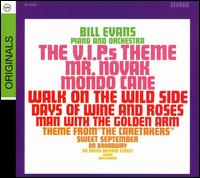
Plays the Theme from The V.I.P.s and Other Great Songs is an album of theme music by jazz pianist Bill Evans with an orchestra conducted by Claus Ogerman recorded in 1963 for the MGM label.
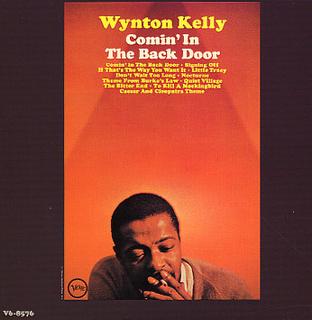
Comin' in the Back Door is an album by American jazz pianist Wynton Kelly released on the Verve label featuring performances by Kelly with Paul Chambers and Jimmy Cobb with guitarist Kenny Burrell and an orchestra recorded in 1963.
Time Remembered is a modal jazz standard composed by jazz pianist Bill Evans.

Lee Konitz Meets Jimmy Giuffre is an album by American jazz saxophonist Lee Konitz and saxophonist, composer and arranger Jimmy Giuffre which was released on the Verve label in 1959.
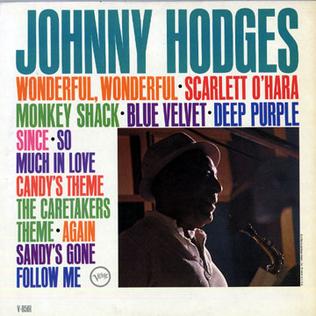
Sandy's Gone is an album recorded by American jazz saxophonist Johnny Hodges featuring performances recorded in 1963 and released on the Verve label.

Warm Wave is an album by Latin jazz vibraphonist Cal Tjader fronting an orchestra arranged and conducted by Claus Ogerman recorded in 1964 and released on the Verve label.
The Maiden and the Nightingale is a piano piece by the Spanish composer Enrique Granados. The piece, which lasts about six minutes, is part of his suite Goyescas which was inspired by the work of the painter Goya.

















